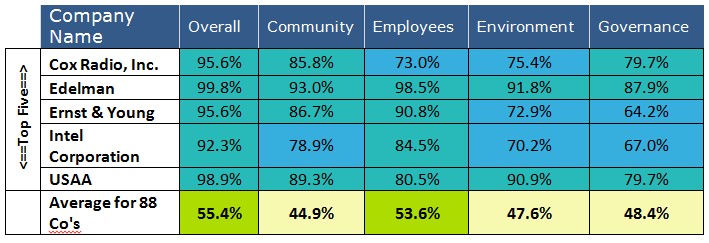Guest Author: Adriana Salazar

A well-known quote from 19th century American writer Mark Twain says “Comparison is the death of joy”, but if you’re a company wanting to create a sustainability strategy that makes business sense, what if I tell you there’s a lot to be happy about in comparing yourself with others?
And what if I tell you mandatory reporting is instrumental in helping you make these comparisons?
By others, of course, I mean your industry peers. Peer benchmarking is the process designed to assist companies in comparing themselves with each other (on specific metrics or processes for instance) in order to grow and make better strategic decisions. If we focus on sustainability benchmarking, the process naturally closes in on sustainability-relevant metrics.
So why benchmark? Companies that grasp the importance of a solid sustainability strategy (and view it as an asset rather than a hindrance) know investors increasingly value this forward-thinking approach. In addition, knowing where you stand against your competitors and identifying strengths and weaknesses for improved strategic decision-making can help your corporation drive innovation and increase bottom line benefits. But for all its benefits (if you follow the blog, you’ll know we’ve discussed this before), the benchmarking process also has its challenges. To name one, sustainability benchmarking is only as good as the data it’s based on.
If you’re a company wanting to benchmark your sustainability data against your peers, you’ll likely want to use third party tools and services offering a good range of data and allowing you to run quick and reliable comparisons on a variety of indicators. But if you think about it, the only reason your company will even have access to this type of data in the first place, is because your industry peers and competitors have made their sustainability data publicly available.
In short, data (always) matters. Good quality and publicly available metrics are at the core of sustainability benchmarking. And this is where the question of mandatory reporting comes in. The next time you hear someone complain about compulsory sustainability reporting, there’s at least one solid argument you can give them: Although voluntary reporting is fairly extended, it’s the mandatory disclosure of key (and sometimes sensitive!) data that’s going to take sustainability benchmarking to the next level. For a corporation to obtain a truly reality-based snapshot of where it stands against its peers, both industry leaders and laggards need to have previously measured and released the ‘metrics that matter’, including those they would rather not report about.
While it’s true that regulatory instruments remain largely voluntary at the global level, mandatory sustainability reporting standards and legislation are increasingly present at the national level. According to GRI’s 2013 ‘Carrots & Sticks’ publication, which analyzed the increasing number of national and international reporting policies from around the world, in 2006, 58 percent of policies were mandatory, while 7 years later, over two thirds (72 percent) of the 180 policies in the 45 reviewed countries were compulsory.
In 2013 (see image below), GRI already highlighted that sustainability reporting requirements and recommendations were on the rise in the EU. More recently, due to the December 2014 EU Directive on the Disclosure of non-financial and Diversity Information by Certain Large Undertakings and Groups, by the end of 2017 an estimated 6,000 public interest companies with over 500 employees, across 28 Member States, will be required to disclose relevant and material environmental and social information in their annual reports.

In addition, increased mandatory reporting (contributing to improve and expand the quality and availability of data for sustainability benchmarking), also means the days of greenwashing are over. Highlighting a few obscure and supposedly ‘green’ KPIs in your next sustainability report is probably not going to convince anyone. Fortunately, globally and in the past few years, sustainability reporting has taken the opposite direction (towards increased disclosure, transparency, visibility, dialogue…), and that’s something we should all be very grateful for.
There are a number of user-friendly solutions to help you benchmark. At Enablon Publisher, we partnered with CSRHub to create a benchmarking tool allowing any corporation to quickly and efficiently measure environmental, social, governance and community performance against industry peers. From a user perspective, all you have to do is enter the name of your company, select your competitors, and start benchmarking!
If the idea intrigues you, visit us at: http://publisher.enablon.com/templates/benchmark/

